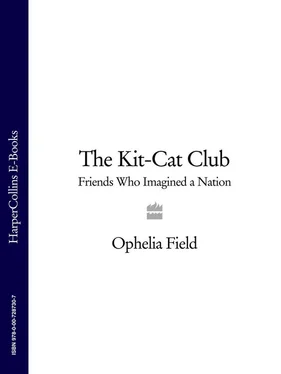Dickens famously remarked that the House of Commons was ‘the best club in London’. 39 With its nepotism, cronyism and oligarchic management, government at the beginning of the eighteenth century was indeed a giant club—MPs were not called ‘members’ for nothing, and those who held government places, voting with the Court in the Commons, were sometimes known as ‘the Club Men’. 40 Kit-Cat spirit translated to wider Whig party loyalty, which magnified itself into national patriotism, and collective identities forged in a tavern's backroom evolved into national identities. Such collective identity was formed most deeply during periods of political adversity, as during the winter of 1700–1.
The King was back to relying, against his own inclinations, on Tories like Laurence Hyde, Earl of Rochester, and the Treasury management of Lord Godolphin. This necessity was confirmed by another Tory-dominated Parliament returned after the election in January 1701.
The Kit-Cat Club's lifespan was characterized by unusually frequent and highly contested elections, averaging one every second year. Individual Junto members' electoral influence, through direct patronage, but also through circular letters and regional party whips, was therefore key to the Club's wider influence. In particular, England saw a notable rise in ‘carpet-bagging’ and boroughs ‘succumb[ing] to affluent, absentee candidates in preference to indigenous minor gentry or merchants’. 41 The Kit-Cat Club contributed to this, in so far as it established bonds between the nobility and London gentlemen who were not their kinsmen, which were then imported into Parliament. 42 Not all MPs who were handed seats without contest failed to serve their constituents honourably, but nor was such an MP likely to challenge his patron's instructions. Lady Mary Wortley Montagu, despite her personal fondness for the Club, remarked that its members were ‘dupes to their leaders’. 43
As in 1698, the Kit-Cats had tried to influence voters in 1701 in ways considered unconstitutional by many at the time: letters from Lord Carlisle to rally support for Whig candidates around the country, for example, led to a Commons vote against peers meddling in elections beyond the counties where they owned property. Halifax and Wharton so aggressively used their interests in Wiltshire to secure election of New East India Company supporters that the Tories afterwards sent the unlucky Whig election agents to the Tower.
After the 1701 election defeat of the Junto Whigs, Robert Harley's supporters nominated him for the Commons' Speakership. It is telling that the Junto did not organize its resistance to this move via the Kit-Cat Club but rather via another Whig club that ran in parallel—the Whig Rose Club, which met at the Rose tavern in Covent Garden. The Rose Club was a far less exclusive and yet more narrowly focused society than the Kit-Cat, founded at around the same time and used by Halifax and Wharton as a place to whip underling Whig MPs into line. Over seventy-five such MPs met at the Rose to co-ordinate their opposition to Harley's appointment as Speaker, but were defeated at the vote in February 1701.
The following month, the Commons passed the Act of Settlement, ensuring the English Crown would pass to the House of Hanover (Electress Sophia, followed by her son George) should both William and Princess Anne die childless. The ministry, including Lord Godolphin and Robert Harley, supported this crucial constitutional measure, and the Act was voted through ‘without any dispute’, 44 since no MP of either party could openly oppose the Protestant succession and hope to retain a career in Williamite government. Behind the scenes, however, certain Tories tried to obstruct the clauses intended to consolidate the Whig model of limited parliamentary monarchy, such as limits on any future monarch's power to dictate foreign affairs. The Junto argued to retain such limitations and so believed themselves the true defenders of English liberties (even against William, if need be). The Act also sounded the death knell for the old Stuart idea of the monarch as God's Anointed, ruling by Divine Right. The succession was explicitly being determined, after all, by an Act of Parliament, not by God. After 1701, allegiance to the Hanoverian succession became an inviolable tenet of the Kit-Cat Club, as for most Whigs—a tenet the Kit-Cats would need to defend with all their energy in future. The Act of Settlement had secured the succession on paper, but it was a long way from being secure in practice.
The inseparability of the Kit-Cat Club's cultural and political pursuits is well demonstrated by the relationship between the parliamentary debate over ‘election’ of England's royal heir and the debate then raging between subjective (Lockean) and objective (classical) theories of criticism. Congreve dramatized the subjectivists' viewpoint in March 1701, just as the Act of Settlement was being passed, in a new musical masque entitled The Judgment of Paris . Congreve turned this piece—about goddesses competing in a kind of beauty pageant—into an actual competition for English composers, with the London Gazette advertising for new songs, the best of which, as voted by the audience, would win £200 (over £26,000 today). Tonson administered the competition. As with the Falstaff performance and Dryden's funeral, the event was a way for the Club to reassert itself culturally during a time of political difficulty, while making a case among intellectuals for a particularly Whiggish theory of critical judgement. They wished to show that, whether choosing one's leaders or one's entertainment, the same enlightened exercise of reason and good taste was required.
Only four musicians entered the competition because it was unfairly believed that the event, like a parliamentary election, would be fixed. A good audience, however, attended to hear the four alternative performances at the Dorset Garden Theatre, which had been lined with tin to improve its acoustics, and prettily decorated with extra candles. ‘The boxes and the pit were all thrown into one; so that all sat in common,’ wrote Congreve, ‘and the whole was crammed with beauties and beaux, not one scrub being admitted.’ 45 Free hot chocolate and cool drinks, including ‘ratafia’ (liqueur flavoured with almond or fruit kernels) and white wine, were served between the pit and the stage. Bracey, or ‘Our friend Venus’ as Congreve fondly called her, ‘performed to a miracle’. She and the other actresses playing the goddesses judged by Paris were at one point in the masque ordered to disrobe and partially did so, making it an extremely erotic performance for its day.
The Kit-Cat patrons dominated the all-Whig subscription supporting this production and competition, with Halifax being its prime sponsor, and Somerset lobbying for his favourite contestant to win. Ironically, as in the last two parliamentary elections, it was not the Kit-Cat candidates who triumphed, however, but another young man, John Weldon, who later became the King's organist.
There was soon little time for such cultural contests, as another parliamentary crisis erupted around the ‘discovery’ of the two secret Partition Treaties. Harley, who only wanted an excuse to further decapitate the Junto Whigs, promptly led his coalition of Tories and radical Country Whigs (who feared William's secret diplomacy as a return to the autocratic ways of Charles II) to attack the Treaties' makers. Declaring passionately that Somers had to be punished or ‘our posterity will curse us’, 46 Harley tried to persuade his fellow MPs to impeach Somers.
On 14 April 1701, Somers delivered a half-hour speech in his own defence to the Commons, ‘with great plainness and presence of mind’, explaining he had only been following the King's orders. 47 He then withdrew before the House voted on his case.
Читать дальше












